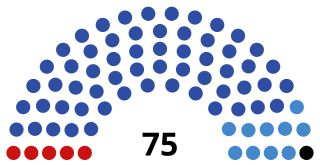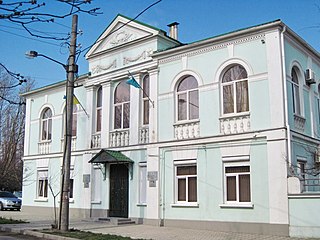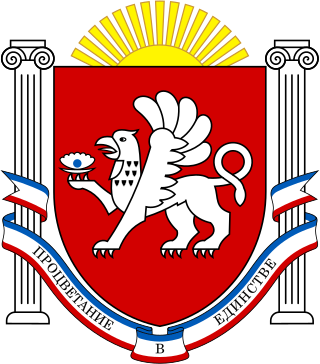
Mustafa Abduldzhemil Jemilev, also known widely with his adopted descriptive surname Qırımoğlu "Son of Crimea", is the former Chairman of the Mejlis of the Crimean Tatar People and a member of the Ukrainian Parliament since 1998. Commissioner of the President of Ukraine for the Affairs of the Crimean Tatar People (2014–2019). He is a member of the Crimean Tatar National Movement and a former Soviet dissident.

The transfer of the Crimean oblast in the Soviet Union in 1954 was an administrative action of the Presidium of the Supreme Soviet that transferred the government of Crimea from the Russian SFSR to the Ukrainian SSR.

The State Council of Crimea is the parliament of the Russia-administered Republic of Crimea. It claims to be a continuation of the 'Supreme Council of Crimea' following a vote by the Ukrainian parliament to dissolve the Supreme Council of Crimea. The Parliament is housed in the Parliament building in the centre of Simferopol.

The Mejlis of the Crimean Tatar People is the single highest executive-representative body of the Crimean Tatars in period between sessions of the Qurultay of the Crimean Tatar People. The Mejlis is a member institution of the Platform of European Memory and Conscience.
The politics of Crimea today is that of the Republic of Crimea on one hand, and that of the federal city of Sevastopol on the other, within the context of the largely unrecognised annexation of Crimea by the Russian Federation in March 2014.

The Party "Soyuz" is a pro-Russian political party in Ukraine that was mostly based in Crimea until 2014. It was registered in June 1997 under a registration number 867.
The 2010 Crimean parliamentary election was held on 31 October 2010 as a part of the general 2010 Ukrainian local elections. Unlike the previous election to the Verkhovna Rada of Crimea, they were conducted on the mixed member proportional representation system. In order to gain representation in the Parliament of the Autonomous Republic of Crimea, a party or bloc had to garner at least 3 percent of the total vote. The Party of Regions won the elections with an overwhelming majority.

Verkhovna Rada of Crimea or the Supreme Council of Crimea, officially the Supreme Council of the Autonomous Republic of Crimea, was the acting Ukrainian legislative body for the Autonomous Republic of Crimea before the annexation of Crimea by Russia in 2014.

Anatolii Volodymyrovych Mohyliov is a Ukrainian politician. He served as the prime minister of Crimea and the Ukrainian minister of Internal Affairs.

Refat Abdurahman oglu Chubarov is a Crimean politician and public figure, leader of the Crimean Tatar national movement in Ukraine and worldwide.
The Crimean status referendum of 2014 was a disputed referendum on March 16, 2014, concerning the status of Crimea that was conducted in the Autonomous Republic of Crimea and the city of Sevastopol after Russian forces seized control of Crimea.
A three-part referendum was held in Crimea on 27 March 1994 alongside regional and national elections. Voters were asked whether they were in favour of greater autonomy within Ukraine, whether residents should have dual Russian and Ukrainian citizenship, and whether presidential decrees should have the status of laws. All three proposals were approved.
Parliamentary elections were held in Crimea on 27 March 1994. The result was a victory for Russia Bloc, which won 57 of the 100 seats in the Supreme Council.
Parliamentary elections were held in Crimea on 31 March 2002. The Communist Party of Ukraine emerged as the largest faction in the Supreme Council, with 15 of the 100 seats, although 46 seats were won by independents.
The annexation of Crimea by the Russian Federation took place in the aftermath of the 2014 Ukrainian revolution. On 22–23 February, Russian President Vladimir Putin convened an all-night meeting with security services chiefs to discuss pullout of deposed President, Viktor Yanukovych, and at the end of that meeting Putin remarked that "we must start working on returning Crimea to Russia.". Russia sent in soldiers on February 27, 2014. Crimea held a referendum. According to official Russian and Crimean sources 95% voted to reunite with Russia. The legitimacy of the referendum has been questioned by the international community on both legal and procedural grounds.

The Autonomous Republic of Crimea is an administrative division of Ukraine encompassing most of Crimea that was annexed by Russia in 2014. The Autonomous Republic of Crimea occupies most of the peninsula, while the City of Sevastopol occupies the rest.
Qurultai-Rukh is a regional organization of the People's Movement of Ukraine and a regional council's faction that consists of members from the Qurultay of the Crimean Tatar People in the Supreme Council of Crimea. The association of Crimean Tatars with the People's Movement of Ukraine started back in 1998. The faction supported the signing of the Ukrainian association with the European Union.

In February and March 2014, Russia invaded the Crimean Peninsula, part of Ukraine, and then annexed it. This took place in the relative power vacuum immediately following the Revolution of Dignity. It marked the beginning of the Russo-Ukrainian War.

The Republic of Crimea is a republic of Russia, comprising most of the Crimean Peninsula, but excluding Sevastopol. Its territory corresponds to the pre-2023 territory of Autonomous Republic of Crimea, a subdivision of Ukraine. Russia occupied and annexed the peninsula in 2014, although the annexation remains internationally unrecognized.
Parliamentary elections took place in the Republic of Crimea on 14 September 2014. These were the first elections since Crimea's illegal annexation by the Russian Federation on 18 March. The outcome was an overwhelming victory for President Vladimir Putin's United Russia party.











